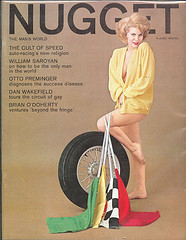Yemeni Government Intensifies Harassment of Journalist Who Presented Counter-Evidence to US Case against Awlaki
Ever since I wrote this post, I’ve been thinking about the fate of Yemeni journalist Abdulelah Haider Shaye. As Jeremy Scahill reported last year, President Obama personally intervened in February 2011 to make sure that Shaye would remain in prison, for terrorism charges presented at a kangaroo court, for at least five years.
In the course of pointing out the holes in the NYT piece on Anwar al-Awlaki, I revisited the discrepancy between what, according to DOJ, Umar Farouk Abdulmutallab confessed to immediately after he was arrested on December 25, 2009 and what, according to DOJ, he said in interrogations conducted a month and more later. I’m now convinced, at a minimum, that the discrepancies are much more problematic than I thought when I first reported the discrepancy, and I also think (though I’m still working on this) that the original confession may be more reliable given other known facts. If that’s true, it significantly undermines the government’s case against Awlaki, as Abdulmutallab is the key known witness attesting to Awlaki’s operational role which — at least publicly — is the key criteria that must be met before Awlaki’s killing was legal (though at precisely the moment Abdulmutallab started cooperating, Dennis Blair described the standard to be something different).
Which brings me to this article, which reports on an interview Shaye conducted with Awlaki some time after the UndieBomb attack, presumably at least several days before it was published and therefore before Abdulmutallab started cooperating. The story originally took Awlaki’s acknowledgment he had “communications” with Abdulmutallab to support its claim that Awlaki “met” with the UndieBomber.
Anwar al-Awlaki, the fugitive American-born cleric accused of terrorist ties, acknowledged for the first time that he met with the Nigerian suspect in the Dec. 25 airliner bomb plot, though he denied any role in the attack, according to a Yemeni journalist who said he met with him.
Mr. Awlaki said he had met and spoken with the Nigerian suspect, Umar Farouk Abdulmutallab, in Yemen last fall, according to the journalist, Abdulelah Hider Sha’ea, who played a digital recording of the cleric’s comments for this reporter.
[snip]
“Umar Farouk is one of my students; I had communications with him,” Mr. Awlaki can be heard saying on the recording. “And I support what he did, as America supports Israel’s killing of Palestinians, and its killing of civilians in Afghanistan and Iraq.”
[snip]
Mr. Awlaki, 38, said on the recording that he had no part in the planning or execution of the bomb plot. He did not say whether he had advance knowledge of it. “I did not tell him to do this operation, but I support it,” Mr. Awlaki said on the tape, adding that he was proud of Mr. Abdulmutallab. [my emphasis]
Nine days later it added this correction, and took the word “met” out of the second though not lead paragraph of the article.
An article last Monday about possible connections between Anwar al-Awlaki, a fugitive American-born cleric accused of terrorist ties, and Umar Farouk Abdulmutallab, the Nigerian suspect in the Christmas Day plot against an American passenger jet, paraphrased incorrectly from comments by a Yemeni journalist about the relationship between the two men. The journalist, Abdulelah Hider Sha’ea, said that Mr. Awlaki told him he had “communications” with Mr. Abdulmutallab last fall, not that the two men had met in person. [my emphasis]
To be sure, the correction (which presumably came from Shaye and not Awlaki) doesn’t rule out Awlaki meeting with Abdulmutallab; it just clarifies that’s not what Awlaki said (or even, to take the most cynical view, that Shaye shifted the emphasis after reports of Abdulmutallab’s cooperation were made public).

